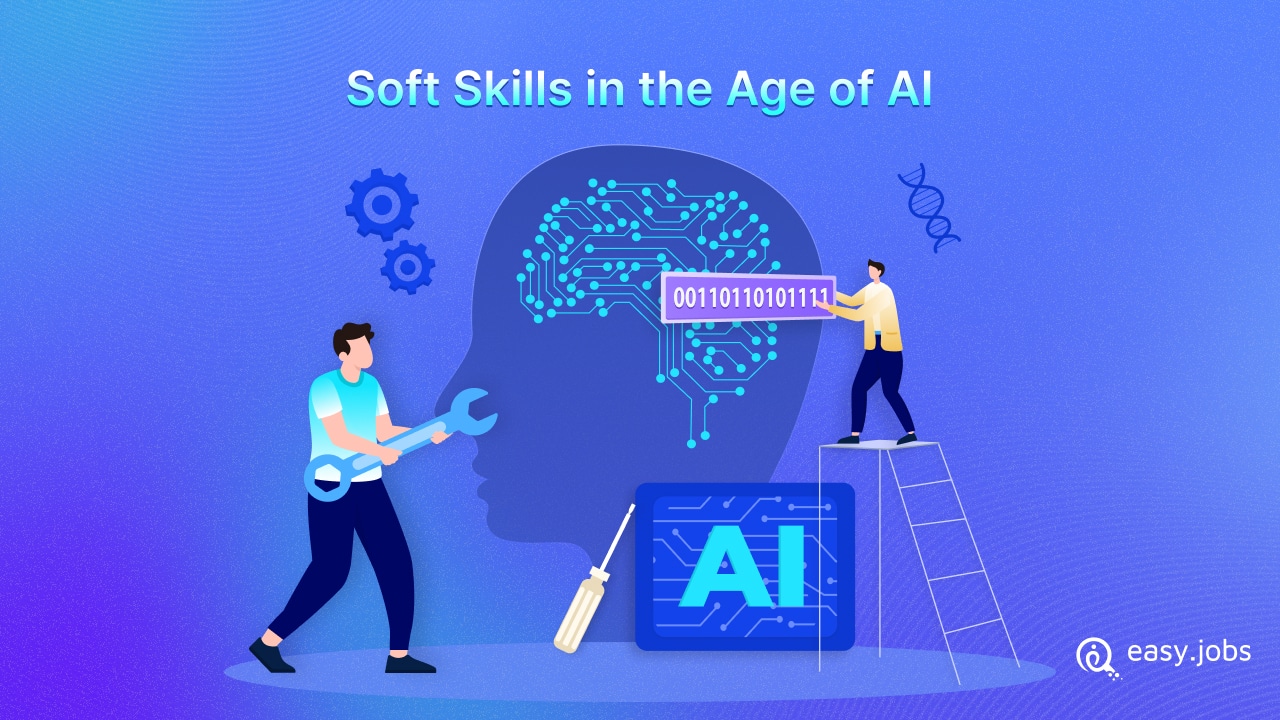Soft skills are more important than ever in today’s rapidly changing landscape, where artificial intelligence (AI) is increasingly integrated into various aspects of our lives. As we see a growing reliance on AI-powered technologies to streamline processes and optimize efficiency, the human touch, embodied in soft skills, becomes increasingly valuable.
Today we will dive into the pivotal role of soft skills in navigating the complexities of this age of AI and uncover why they matter more than ever in shaping our personal and professional success.

What Are Soft Skills: Knowing the Basics
Let us get started by gaining a better understanding of what skills or abilities are considered soft skills. In general terms, soft skills are a set of personal attributes, interpersonal skills, and communication abilities. It enables individuals to interact effectively and harmoniously with others in various professional and social settings. These skills are not limited to only basic conversational ones.
Unlike technical or hard skills, which are job-specific and teachable through training and education, soft skills are more difficult to quantify. These usually develop over time through practice, experience, and self-awareness. They are highly valued by employers as they contribute to individual and team successes as well as overall organizational effectiveness.
The most popular soft skills sought after in employees include:
- Communication
- Teamwork
- Adaptability
- Problem-solving
- Leadership
- Emotional Intelligence
- Creativity
- Conflict resolution
- Networking, etc.
An example will help you understand and distinguish between soft skills and technical skills. For instance, communication is a soft skill that involves the ability to convey information effectively, listen attentively, and interact with others actively. It’s crucial for collaborating with team members, presenting ideas, and understanding user needs.
On the other hand, programming is a technical skill that involves proficiency in writing code, understanding algorithms, and solving technical problems. It’s essential for roles in software development, data analysis, and IT infrastructure management.
If you can combine soft and hard skills in the right proportions, businesses, projects or interpersonal communication will bloom.
Why You Still Need to Nurture Soft Skills in the Age of AI
In this day and age of AI, when everything is managed by AI, it is understandable to wonder whether we should cultivate soft skills or not. Today, we will look at why we still need to nourish and pursue them.
- Jobs in fields such as healthcare, counseling, education, and hospitality demand soft skills. It is needed to build rapport, understand nuanced human emotions, and provide personalized experiences that AI cannot replicate.
- Effective collaboration and teamwork often rely on soft skills like communication, active listening, and conflict resolution. While AI can enhance productivity by streamlining workflows and providing data-driven insights, it cannot replace the energy and creativity that arise from human interaction.
- Soft skills such as critical thinking, creativity, and intuition are vital for complex decision-making and problem-solving scenarios where there is no one-size-fits-all solution. Such as team leading. Humans possess the ability to evaluate multiple factors, consider ethical implications, and make judgments in ambiguous situations.
- In customer-facing roles, soft skills play a pivotal role in delivering exceptional service and fostering long-term relationships. Customers value human interactions characterized by empathy, active listening, and personalized attention.
- The rapid pace of technological advancement requires individuals to continuously adapt and upskill throughout their careers. Soft skills such as adaptability, resilience, and a growth mindset are essential for thriving in an ever-changing landscape.
- As AI becomes increasingly integrated into various domains, concerns about ethics, bias, and accountability become more pronounced. Soft skills such as ethical reasoning, empathy, and moral judgment are critical. It ensures that AI technologies are developed, deployed, and regulated responsibly.
6 Soft Skills That Matter in the Age of AI
Now, it’s time to dive into the list of soft skills that you should start practicing. We have researched, analyzed, and picked must-have 6 soft skills that will keep you ahead in the age of AI.
1. Developing Listening Skills
There are three approaches to listening. The first is to “listen to affirm,” which means telling someone what their conversation sparks inside of you. Typically, this entails referencing something you have learned, read, or encountered. This type of listening can be analogous to “waiting to speak,” allowing you to confirm what you already know.
The second approach to listening is to “listen to defend.” In court, lawyers listen like this. When you take a position that contradicts what is being said or offered, you may limit your options while waiting for a counter-punch. Do you really understand what is being said?
The third approach to listening is to “listen to discover.” The term discovery refers to what you may learn, gain, or uncover during a conversation. You can’t overlook this soft skill in the age of AI and mastering any of these listening styles can help you grow your career as well as your social life. So start practicing it.
2. Improving Presentation Skills
Have you ever seen a presentation on stage that contained more non-meaningful words like ums, uhs, etc. than you would like? Attention to detail is essential in a presentation, which means selecting the words that will help you the most (and eliminating those that will not). One important communication principle: the simplest message is the most powerful. Your ability to communicate your ideas will teach others how to treat you, compensate you, and follow your lead. According to the popular saying, “communication” is the most important soft skill a leader can have.

3. Practicing Emotional Intelligence
With the rise of virtual interactions and AI-powered customer service, emotional intelligence is becoming increasingly important for connecting with people and understanding their needs and emotions. Empathy, active listening, and effective communication are critical for building trust and rapport in AI-mediated interactions.
4. Cultivating Ethical Reasoning
Human oversight is essential to mitigate potential biases, address ethical dilemmas, and uphold ethical standards even in AI-driven decision-making processes. As artificial intelligence becomes more integrated into various aspects of society, ethical concerns become more important. Individuals who can navigate ethical quandaries, predict unintended consequences, and advocate for responsible AI use are critical. It will ensure that AI technologies benefit society while causing minimal harm.
5. Practicing Collaboration in Work Life
Soft skills are essential for creating a collaborative environment in which diverse perspectives are valued and teams can work together to achieve common goals. While artificial intelligence can streamline processes and automate tasks, effective collaboration is still required to leverage diverse perspectives and harness collective intelligence. Individuals who can work seamlessly with AI systems and effectively with colleagues from diverse backgrounds help organizations succeed.
6. Developing Resilience and Adaptability
Resilience is the ability to recover from a difficult situation. Fortunately, for all of us on the other side of the pandemic, we have discovered (and used) our resilience. Remember the difficult times you have been through, and take note of how you have survived. While the past serves as a reminder, it does not define us. We all have the capacity to adapt and change. Even when things were difficult, you found a way to get through. You can do it again; this is how adaptability and resilience work.
While AI continues to change the way we work and interact, soft skills remain critical for roles that require human-centered qualities such as collaboration, decision-making, customer engagement, adaptability, and ethical oversight. Individuals and organizations can effectively navigate the complexities of the digital age by combining AI capabilities with the distinct strengths of human soft skills. Hopefully, this article can convince you why soft skills are important in the age of AI and why you should pursue them. Want to keep getting these kinds of impactful articles into your inbox? Then subscribe to our blog now. See you in the next article.









